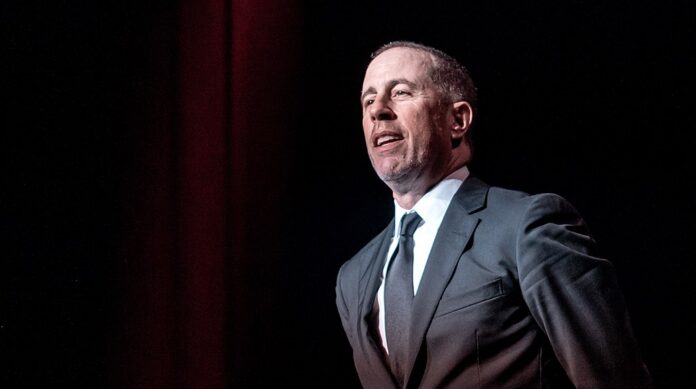The comedian critiques societal changes and the erosion of hierarchical structures, sparking debate on cultural evolution
Comedian Jerry Seinfeld expressed nostalgia for the era of “dominant masculinity” during a recent appearance on The Free Press podcast “Honestly with Bari Weiss.” Reflecting on his youth, Seinfeld remarked that he always aspired to be a “real man” like prominent figures such as John F. Kennedy, Muhammad Ali, and Sean Connery. However, he admitted that his career in comedy kept him from achieving this ideal, as comedy is inherently a “childish pursuit.”
Seinfeld’s comments sparked a broader conversation about cultural shifts and the erosion of traditional societal structures. “I miss a dominant masculinity,” Seinfeld stated, acknowledging the issues of toxic masculinity but emphasizing his appreciation for what he considers “a real man.” He cited iconic personalities from his youth, emphasizing their influence on his understanding of masculinity.
Embed from Getty ImagesThe comedian also discussed his new film “Unfrosted,” which centres on the 1963 rivalry between cereal giants Kellogg’s and Post. When asked if the film was driven by nostalgia for a bygone era, Seinfeld agreed, noting that the past had a clear “agreed-upon hierarchy” which he believes is missing in today’s society. This lack of hierarchy, according to Seinfeld, contributes to erratic behavior and a sense of societal disorientation.
Seinfeld elaborated on this idea, suggesting that humans inherently seek hierarchical structures for comfort and stability. He argued that the absence of such structures in contemporary society contributes to widespread frustration and chaotic behaviour. This perspective aligns with his broader critique of modern American culture, which he feels has been negatively impacted by the “extreme left” and excessive political correctness.
During an April episode of the New Yorker’s Radio Hour, Seinfeld expressed concern over the diminishing presence of quality comedic entertainment. He lamented the loss of classic sitcoms like “Cheers,” “M.A.S.H.,” and “The Mary Tyler Moore Show,” attributing this decline to the pervasive influence of political correctness and fear of offending audiences. Seinfeld believes that this environment stifles creativity and humour, leading to a dearth of genuinely funny content on television.
Seinfeld’s comments have ignited debate about the evolution of masculinity and societal norms. Critics argue that his views are outdated and fail to acknowledge the progress made in addressing gender equality and toxic behaviours. Supporters, however, resonate with his longing for a time when societal roles and expectations were clearer.
In-Depth Analysis
Jerry Seinfeld’s reflections on masculinity and societal changes offer a lens through which to examine broader cultural dynamics. His nostalgia for “dominant masculinity” highlights a tension between traditional gender roles and contemporary efforts to redefine them. This tension is not merely about gender but also about the structures that underpin societal interactions.
From a political perspective, Seinfeld’s critique of the “extreme left” and political correctness echoes a common narrative among those who feel that progressive movements have gone too far in curbing free expression. This viewpoint posits that excessive sensitivity and the fear of offending have created a cultural environment where genuine humour and open dialogue are stifled.
Sociologically, Seinfeld’s comments on hierarchy tap into a deeper conversation about the need for structured systems in society. Hierarchies, whether in families, workplaces, or broader social contexts, provide a framework for understanding roles and responsibilities. The erosion of these structures, Seinfeld argues, leads to societal disarray and a sense of instability. This perspective suggests that while challenging traditional hierarchies is necessary for progress, entirely dismantling them without alternatives can create confusion and discomfort.
Economically, the shift in media and entertainment that Seinfeld bemoans reflects broader industry trends. The rise of streaming platforms and niche content has fragmented audiences, reducing the shared cultural touchstones that once defined collective entertainment experiences. This fragmentation mirrors the broader economic trend of market segmentation and the decline of mass media’s unifying influence.
Locally, Seinfeld’s observations resonate differently depending on community values and cultural norms. In some regions, traditional notions of masculinity and hierarchy remain prevalent and are seen as stabilizing forces. In others, progressive values that challenge these notions dominate, reflecting a shift towards more fluid and egalitarian social structures.
Gender analysis reveals the complexity of Seinfeld’s position. While he longs for a time when men like Kennedy and Ali epitomized masculinity, this idealization overlooks the exclusion and marginalization of those who did not fit this mold. Efforts to redefine masculinity aim to create a more inclusive understanding that allows for vulnerability, emotional expression, and rejection of harmful stereotypes.
Finally, race and minority perspectives are crucial in this discussion. The figures Seinfeld idolizes largely represent a specific demographic that historically held power and privilege. For marginalized communities, the erosion of such dominance can be seen as a positive step towards greater equality and representation.
In conclusion, Jerry Seinfeld’s reflections serve as a catalyst for examining the intersections of gender, culture, and societal structure. His views, rooted in nostalgia, highlight the complexities and challenges of navigating cultural evolution in a rapidly changing world.
